What's it really like on the ground at UQ's Gaza Solidarity Camp?

It’s a Wednesday evening in early May, cool but not too cold.
I’m sitting under the big fig tree at the corner of the University of Queensland’s Great Court.
Lorikeets are screeching overhead as they settle to roost. A constellation of warm-glowing fairy lights have just flicked on in the branches above me. And I can honestly say that I’ve never felt prouder to be an alumni of this university.
Of course, I’m not proud of the university itself; UQ remains an elitist, neoliberal institution that encourages its students to value personal financial gain ahead of knowledge and social justice, sells out routinely to unethical industries, and systematically exploits both its workers and the students themselves (the word ‘extortionate’ no longer feels sufficient to describe soaring international student fees).
But tonight I’m feeling proud of this place because, just like thousands across the globe, UQ students and staff have stepped up to establish and maintain a protest camp in solidarity with Gaza, under the banner of UQ Students for Palestine. They're practising what they preach, and finding creative ways to speak out against injustice in a society that continually tells them they’re powerless and insignificant.
It’s pretty damn inspiring.
@jonnosri University of Queensland students are organising protests against the Boeing research institute and have established a protest camp calling on UQ to cut all ties with Israel.#freepalestine #studentsforpalestine ♬ original sound - Jonathan Sriranganathan
The University of Queensland is directly complicit in the genocide of the Palestinian people. It hosts a research institute for Boeing – a multinational aircraft and weapons manufacturing company – that sells bombs and planes to the Israeli regime, and has had various collaborative relationships with a range of other military and surveillance companies.
UQ has also been very circumspect about whether it has any direct financial investments in companies that support and profit from the invasion of Gaza, and its politics and international relations courses tend to reinforce colonial and western imperialist narratives and frames of what’s going on in West Asia/the Middle East. It’s an obvious local target for pro-Palestine protests.
The students have three broad demands of their university:
- shut down the Boeing research centre and get all weapons companies off campus
- boycott and refuse to collaborate or do business with any companies or educational institutions that are complicit in the genocide
- transparently disclose where UQ invests its money, and divest from any companies/institutions that are profiting from the invasion of Gaza
At the time of writing, I counted 75 tents in the camp, mostly smaller dome tents but also a couple of larger ones that are tall enough to stand up in and accommodate multiple people. UQ Students for Palestine don't have many formal camp rules, but they've asked participants to avoid alcohol, recreational drugs, and smoking while at the camp (although I’ve already spotted a couple of people vaping – bloody rule-breakers!).
The occupation has grown quickly in its first week.
Hundreds of students have already taken turns camping out. Some have been sleeping in tents almost every evening, while others are alternating nights at home and nights in the Great Court (I was here on the first day when the camp was established, and I came back to run an open mic poetry session last Sunday evening, but I haven't yet camped out overnight).
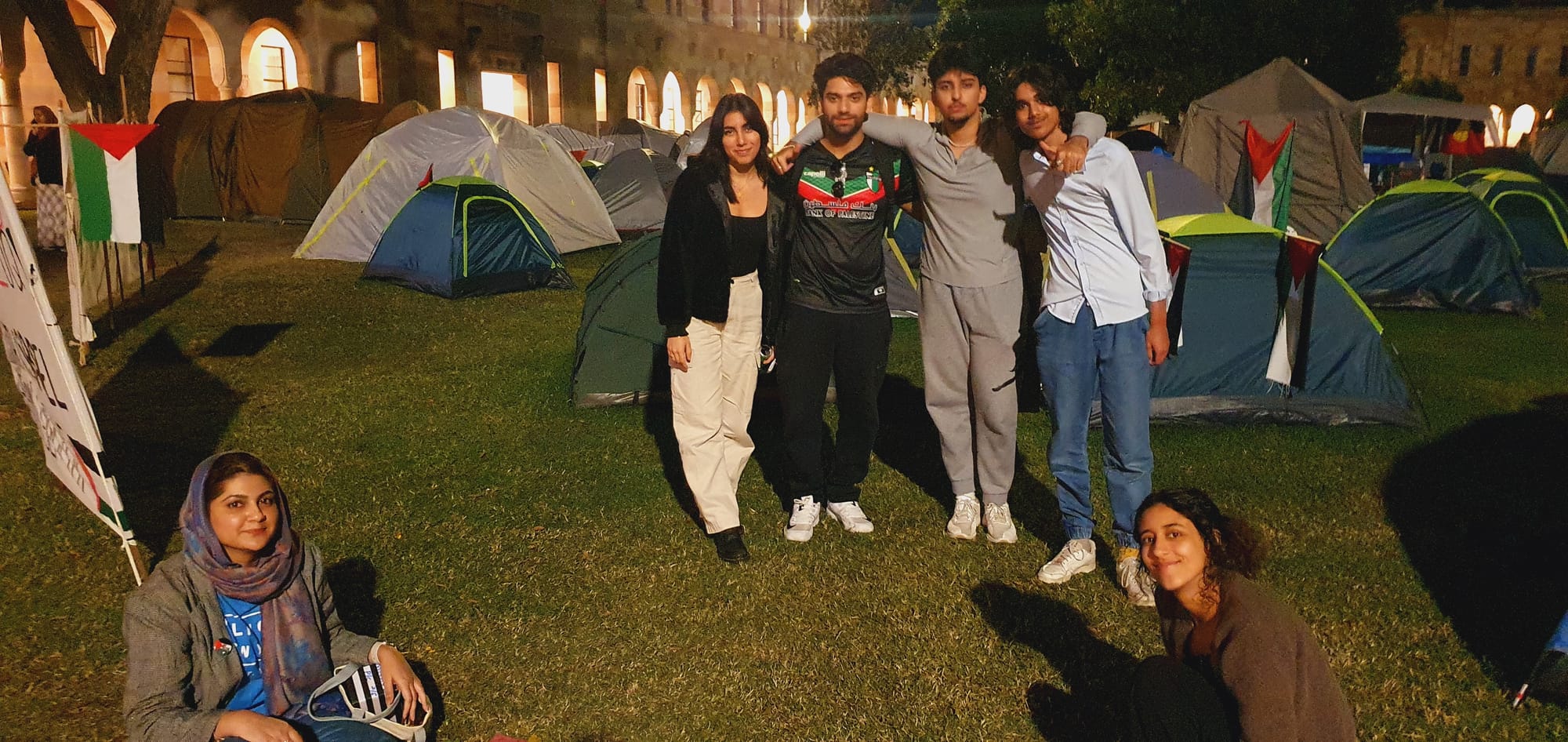
Yes it’s cliché, but this really is a vibrant and inclusive space
This evening, the camp feels calm and peaceful, but also alive with activity.
UQ Greens volunteers (accompanied by State MPs Amy MacMahon and Michael Berkman) have just finished handing out the last sausages from their afternoon BBQ.
And now more free food is arriving; an occupational therapy student is dropping off a large tub of warm, home-cooked meals that her family have prepared for the protesters.
Near me under the fig tree, a circle of 20 people – members of the Brisbane Free University Radical Reading Group – are reading and discussing the poetry of Alison Whittaker.
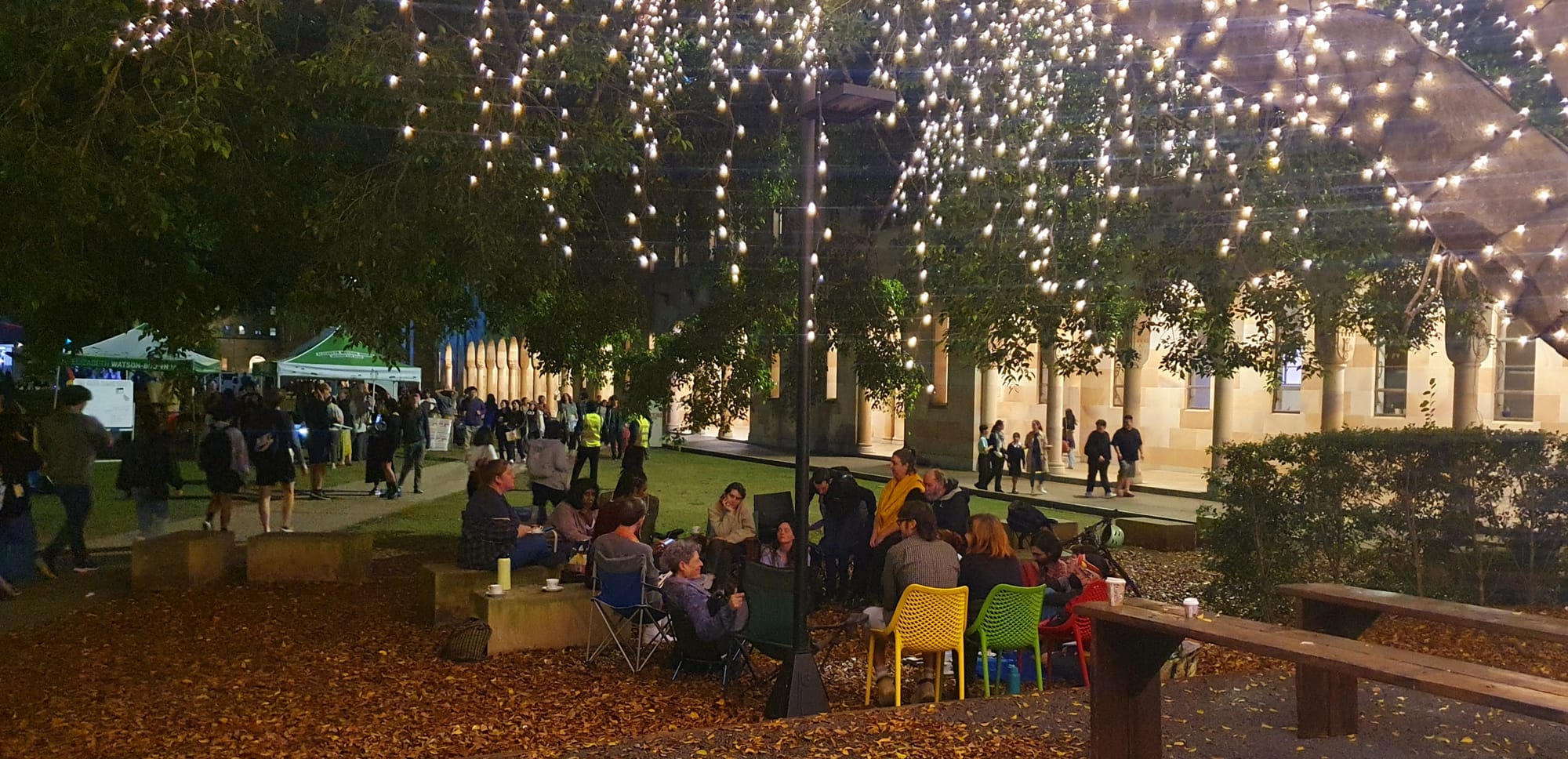
A couple of students with clipboards are soliciting petition signatures from passersby – they’re aiming to collect at least 1200 signatures so they can call an official General Meeting of students and make their demands a formal position of the UQ Student Union.
Socialist Alternative had scheduled a 6pm teach-in on the topic of ‘State Violence and Student Resistance’ and around 15 of them are hanging out chatting politics near their gazebo.
Meanwhile Malaak, a Palestinian student, has organised a 7:30pm film screening under one of the larger tenants, and people are setting up the projector screen and double-checking the battery system.
A wide range of groups are involved in the camp, from the anti-zionist Jewish collective Doykeit Magandjin to the anti-war activists from Wage Peace and Demilitarise UQ, and even the Anarchist Communists Meanjin. But probably the biggest ongoing presence is from the UQ Muslim Students Association and the UQ Muslimah Society.
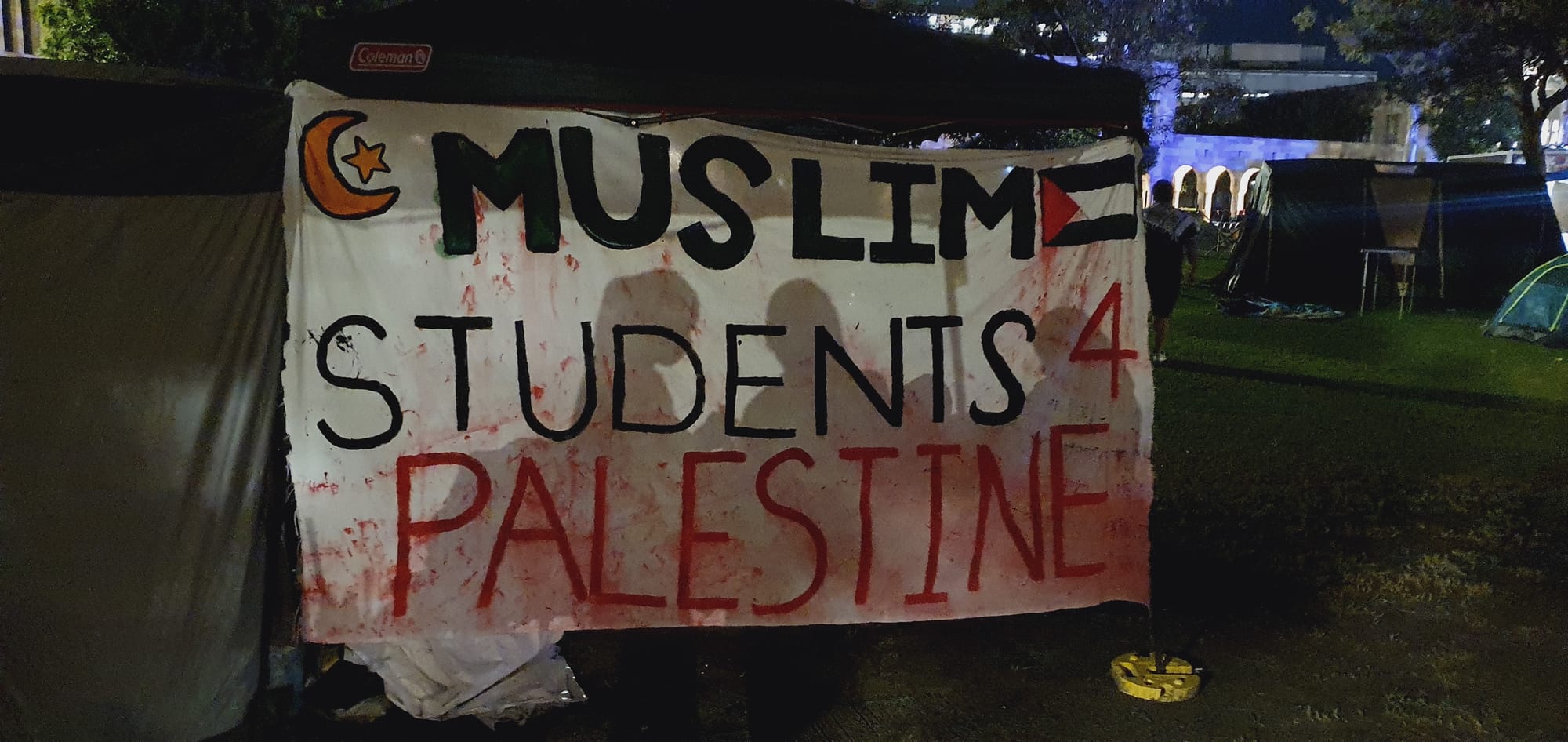
Late into the evenings, groups of Muslim students and staff can be found working away on their laptops, or sitting chatting in circles of foldable camp chairs. Last Friday, over a hundred people gathered in the Great Court (despite the rain) for the Jumaah prayers.
Anyone who tries to claim that the protesters are an unrepresentative vocal minority is kidding themselves, or deliberately misleading you.
This is one of the most diverse and inclusive spaces I’ve ever seen on campus.
Prime Minister Albanese’s recently reported comment suggesting that the student protest camps were “just Trots (Trotskyists) who are looking to instigate and make trouble” was noteworthy primarily because of how far off the mark it was – a signifier of how shallow the Labor Party leadership’s intel and understanding of university student political sentiment has become.
Admittedly, the Socialist Alternative crew are very prominent and visible at the camp, and to their credit, several of the most active organisers who initiated the camp are anti-Stalinist socialists, but the politics and affiliations of the people participating in this movement are extremely varied.
Crucially, participants aren’t sticking to siloed factions – there’s heaps of cross-pollination and collaboration. And most people aren’t closely connected to any particular group – they’re just there as individuals who are deeply concerned about the genocide of the Palestinian people, and want to connect with like-minded allies.
There’s a lot to be said about the political potential of places like this – young people of different backgrounds and academic disciplines meeting and learning from each other, experimenting in how to share and collectively manage public space.
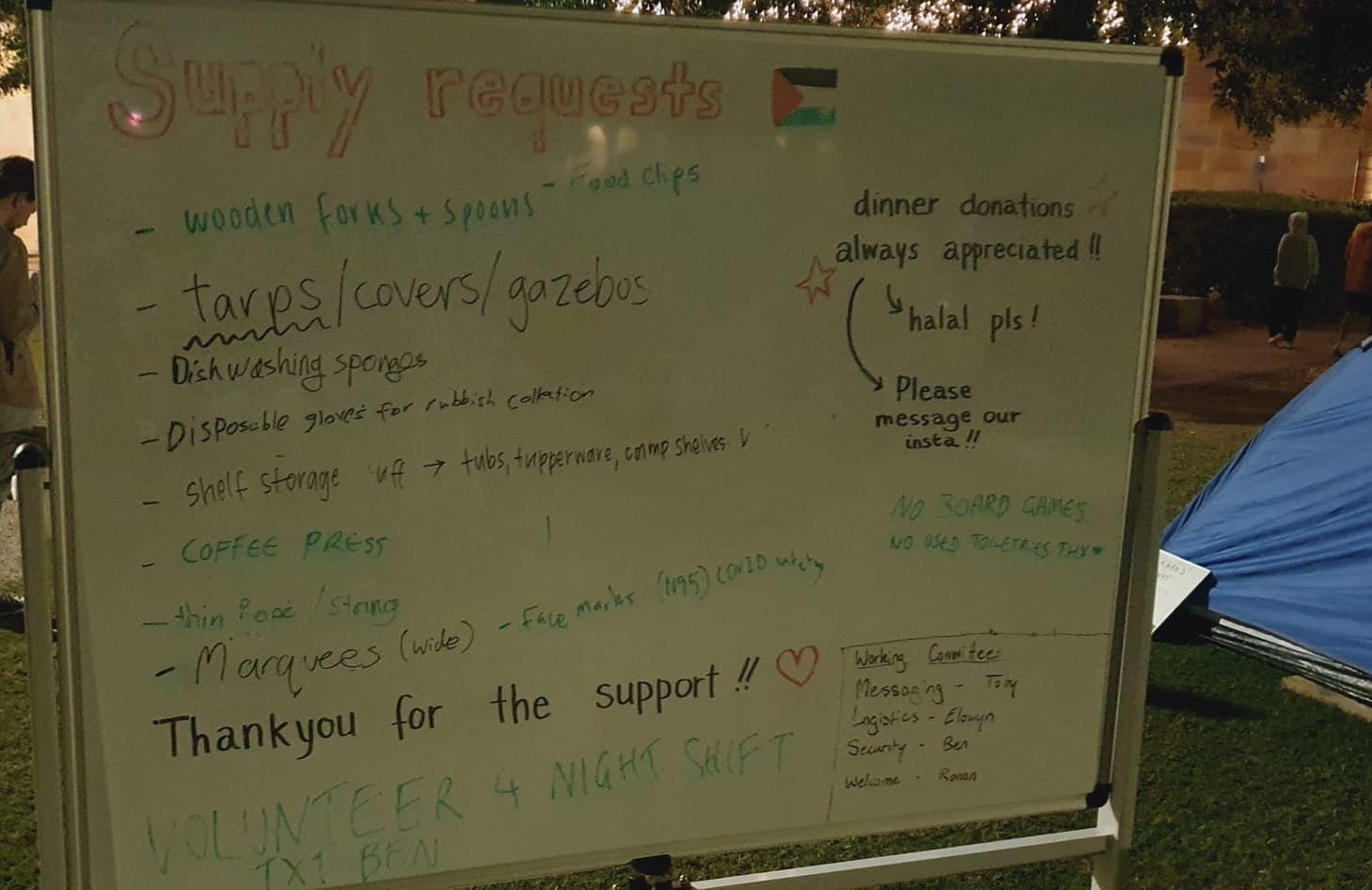
Today's lunchtime teach-in (organised by Brisbane Free University) on the topic 'Media Complicity and Settler Colonialism' featured highly-regarded First Nations journalists Amy McQuire and Nick Chesterfield, and was one of the most insightful public talks I’ve been to in recent years... Camp participants aren't just regurgitating existing ideas, but recombining knowledge, experiences and analyses to develop new ways of seeing the world.
On the far side of the Great Court, a couple of pro-Israel activists have set up their own much smaller camp, festooned with large Israeli and Australian flags. On the multiple occasions I’ve visited the Great Court, I haven’t observed any interactions between the two camps, and everyone I’ve spoken to reported that there hadn’t been any direct conflict between anti-invasion and pro-invasion activists. When Israel is dropping literal bombs on civilian homes in Rafah, the complaints of a few people claiming that the pro-Palestine protests are ‘offensive’ or make them feel ‘unsafe’ (apparently, acknowledging that Israel is engaging in genocide is ‘offensive’ now – WTF?) seem inconsequential and irrelevant.
Meanwhile the Gaza Solidarity Camp is emerging as both a hub of anti-colonial organising and networking, and as an important source of information to counteract misreporting and silencing from the mainstream media.
Of course I don’t want to exaggerate or over-inflate the reach and impact of this action: It’s only 10 days in, so most of UQ’s 50 000+ students won’t yet have had any meaningful engagement with the solidarity camp. And it’s fair to say that some of those who do have passing conversations with the earnest, sometimes-awkward clipboard-wielding petitioners will come away unconvinced or unimpressed.
Campus-based activism has been hollowed out in recent decades, and years of too-intense haranguing from Socialist Alternative campaigners has perhaps predisposed a fair chunk of the student body to instinctively dismiss and ignore anyone on campus who tries to talk to them about politics.
But this action feels different.
Already, the Palestine Solidarity Camp is the biggest and most visible on-campus political mobilisation since the 2005 protests against John Howard’s VSU changes, but I don’t think anyone in the early 2000s ever went so far as to establish a permanent protest camp.
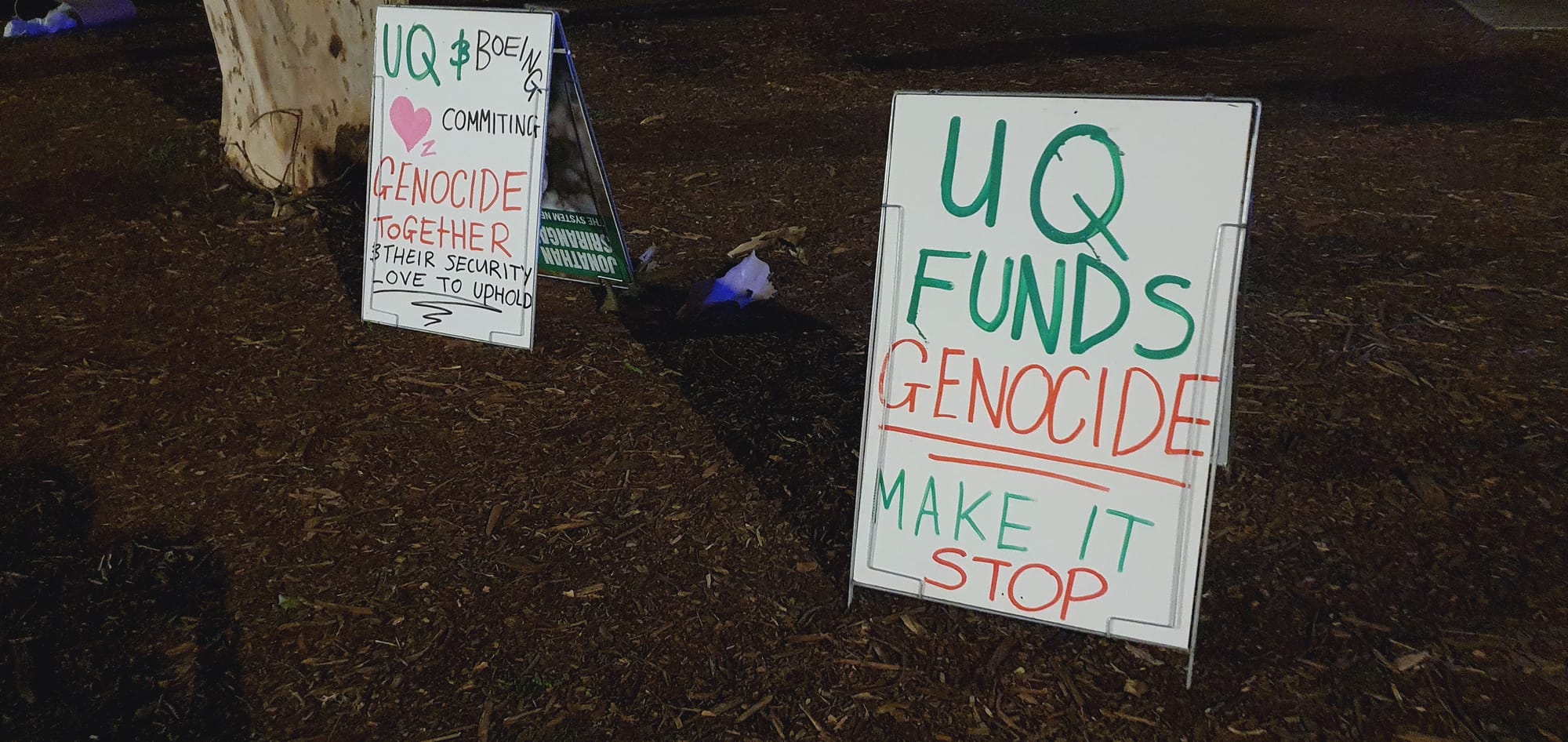
The counter-punch is coming
Now the conservative establishment is beginning to move against the protests. People in power are evidently waking up to the fact that large numbers of politically engaged students, staff and other activists getting together to share ideas and skills could be quite destabilising to neoliberal hegemony. We’ve seen this pattern play out many times before…
Sensationalist Sky News and Courier Mail stories will play up the narrative that there is ‘tension’ between pro-Palestine and pro-Israeli students.
Unconfirmed reports of vandalism or verbal abuse will be stripped of context and repeated endlessly to depict (inaccurately) a general climate of growing disorder and unrest.
Conservative politicians will pile on with claims that the camp is actually run by ‘outside agitators,’ and will demand that the police be sent in to break up the camp in the interests of ‘public safety.’
The university’s leadership – which also secretly hates that the protest is critiquing their relationship with Boeing – will use all this as a basis to declare that the protesters have made their point, but now it’s time to get ready for end-of-semester exams, and that unfortunately the camp has become an unwelcome distraction for ‘the majority’ of students who are just trying to study.
Part of the problem will be that very few – if any - mainstream journalists have spent enough time at the camp to get a realistic understanding of what it’s actually like.
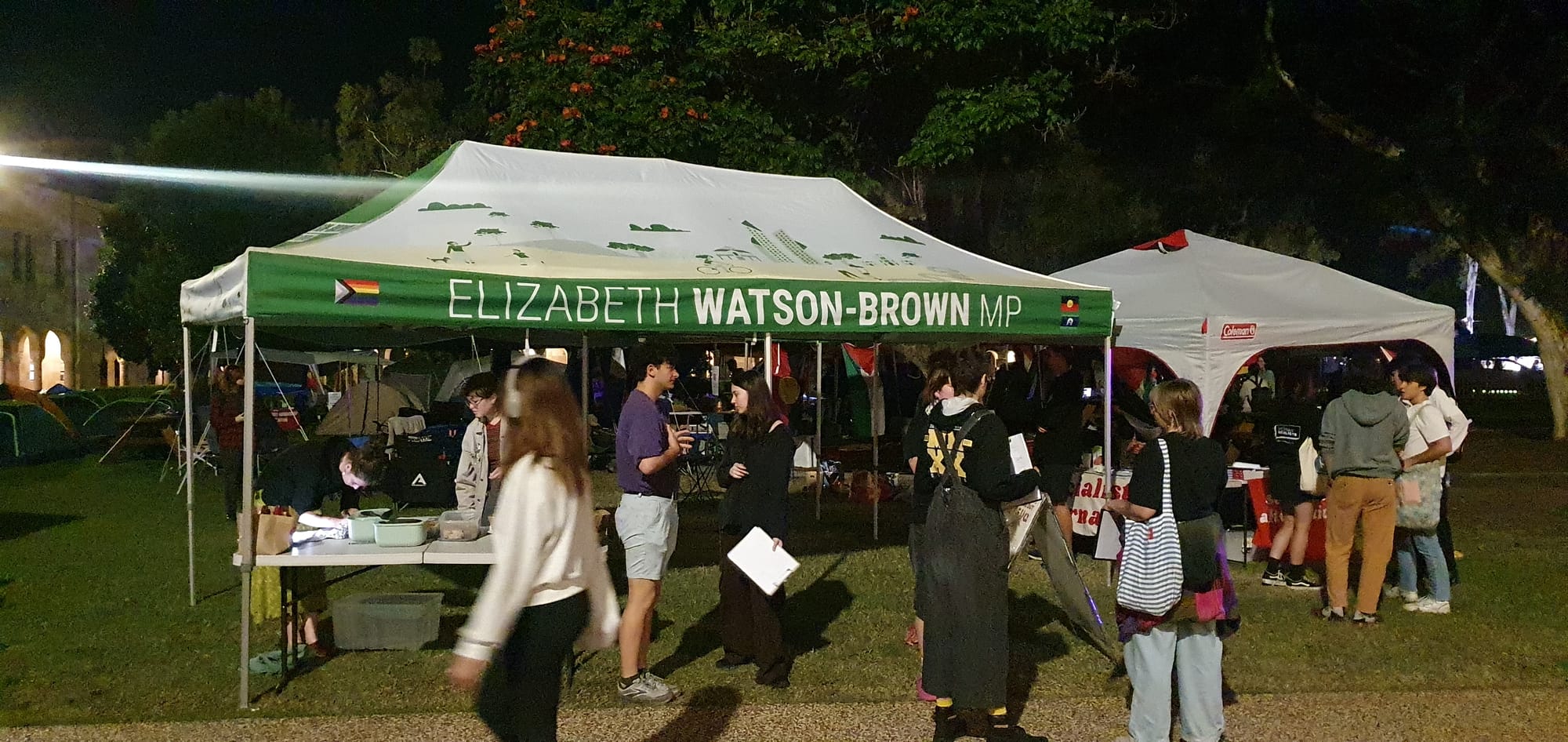
ABC, for example, has strict rules that no journalists, producers or other behind-the-scenes staff are allowed to attend any kind of protest unless they are officially assigned there to report on breaking news.
These kinds of absurd restrictions on freedom of assembly and association mean that the vast majority of Brisbane-based journalists rarely attend protests in person, and rely on second-hand testimony from police and other power-holders about the vibe on the ground. They hear from establishment power-holders about how ‘dangerous’ and ‘disorderly’ certain protests are and accept this as truth.
Then – after years of never personally attending any kind of occupation or protest march – a journo is directed to report on one, and finds themselves in the middle of a big group of angry people shouting and banging on windows, which they inevitably describe as ‘frightening and distressing scenes’ even if in reality there’s more shouting and abuse at the average footy match.
Misreporting could in turn build wider support for police repression, or at least might discourage more people from joining the movement, and distract from the action's broader message and goals.
But right now at the camp itself, the message is clear: People are here for Palestine.
They’re gathering throughout the day and camping overnight because it feels like the most effective way for them to stand against the carnage and misery that the Israeli occupation is inflicting upon the Palestinian people.
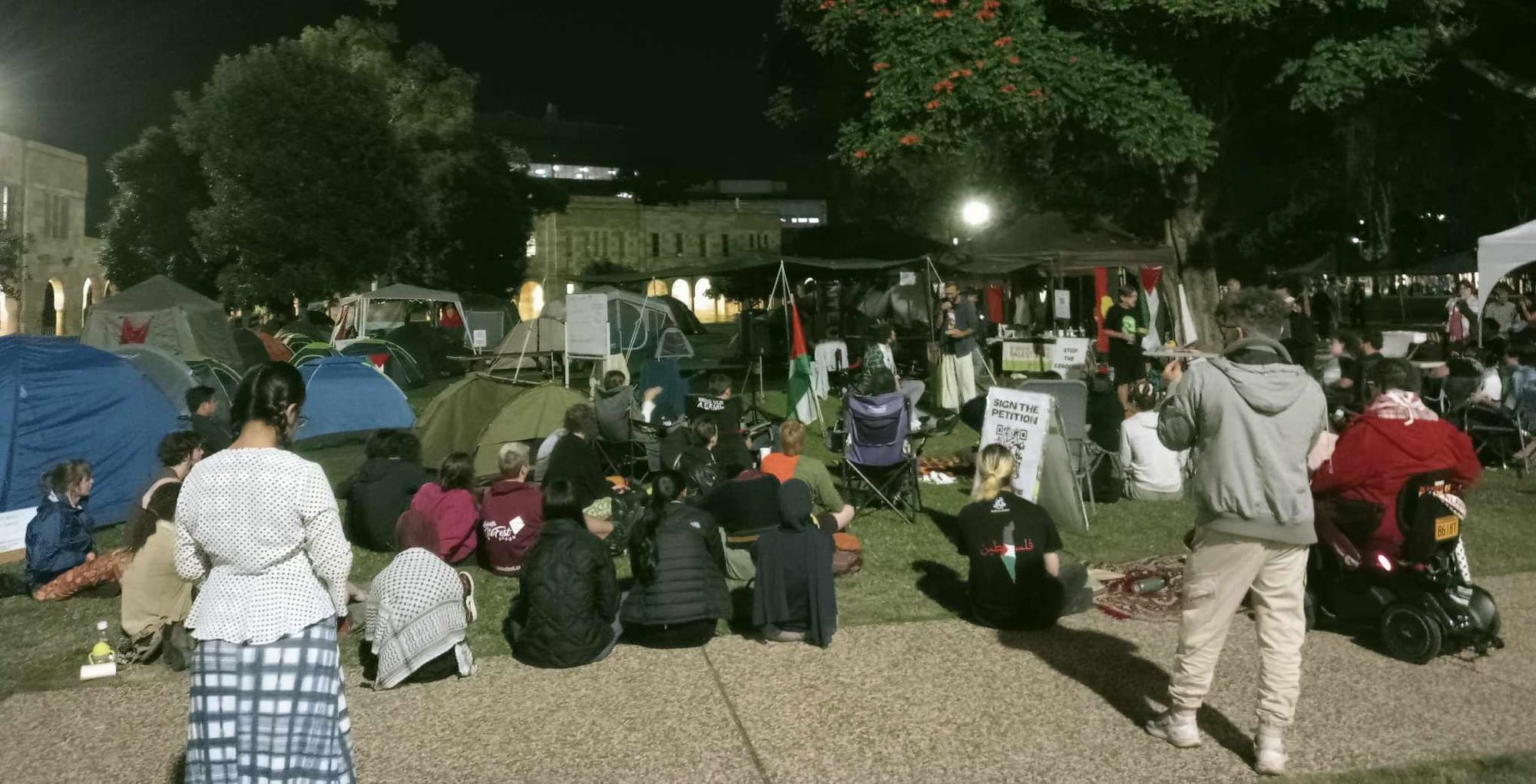
Perhaps one of the most interesting conversations I’ve had this evening was with a young guy (probably 19 or 20 years old) who arrived at around 6:30pm to set up his tent in the dark. He didn’t go to UQ and said he didn’t know anyone else at the camp – he was studying at one of the local TAFE colleges, but had heard about the occupation and wanted to show his support for the Palestinian people.
I’m sure the conservative establishment will try using the fact that a few non-UQ people are joining the protest camp to delegitimise it, but it’s actually one of the most potent and exciting aspects of the movement, which I think organisers should welcome (and let's be real: if it was only UQ students, they’d use the opposite argument to criticise it – “oh that’s just a bunch of privileged inner-city intellectuals who are disconnected from the real world!”).
But this is most definitely not a wankfest of upper-middleclass ivory tower types play-acting at activism.
People from all walks of life are being drawn to the solidarity camp, and in turn are making new connections across class and cultural boundaries.
It’s hard to say where this will lead to. But right now, it feels powerful and meaningful and important.
If you're feeling a little overwhelmed or depressed about the state of the world, getting down here to the solidarity camp should give you a decent dose of optimism.
The students have asked the rest of us to support the camp however we can, and for everyone in the broader community to step up and find ways to support the struggle for a free Palestine.
Don't leave it all up to them.
Note: For this piece, I avoided including too many close-up photos of individuals' faces or direct quotes from interviewees, partly to protect individual participants from targeted repression, and partly because I don't want to disproportionately elevate the voices and perspectives of some individuals while inadvertently marginalising others. Instead, the write-up includes links to the public channels of different groups involved in the camp, so you can follow their platforms for yourself to see what they're saying.
However below I've also included a rough, unedited recording of my interview with Liam Parry from Students for Palestine, to give you more of a sense of how things are going on the ground. If you'd like to read more reporting from the camp, or you believe I've missed something important, leave a comment or flick me an email at office@jonathansri.com
If you value this kind of writing and commentary, please consider becoming a subscriber to support me to keep doing it...
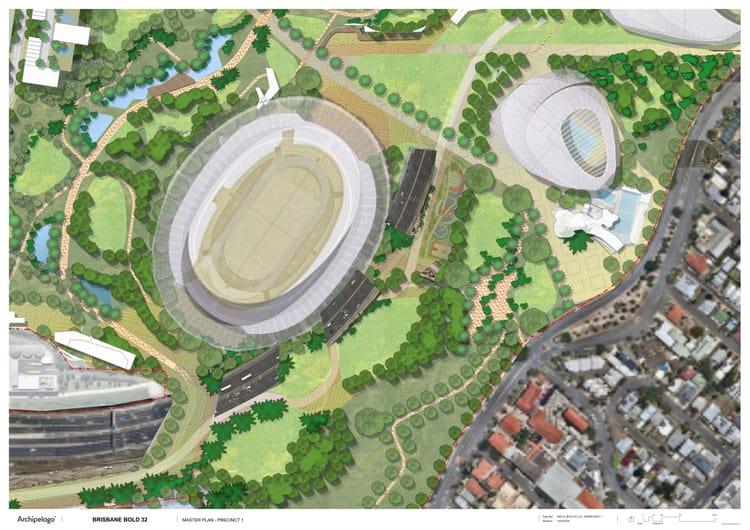
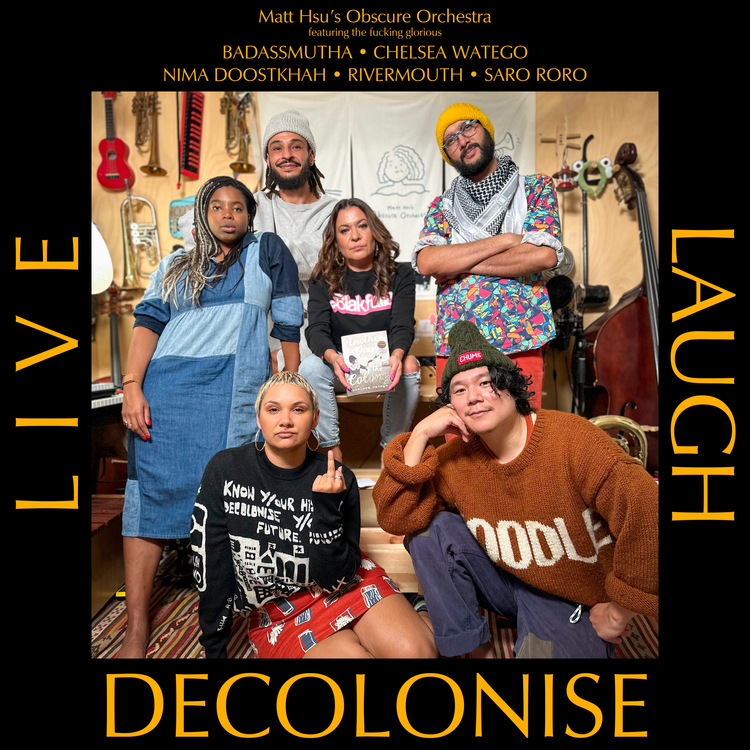
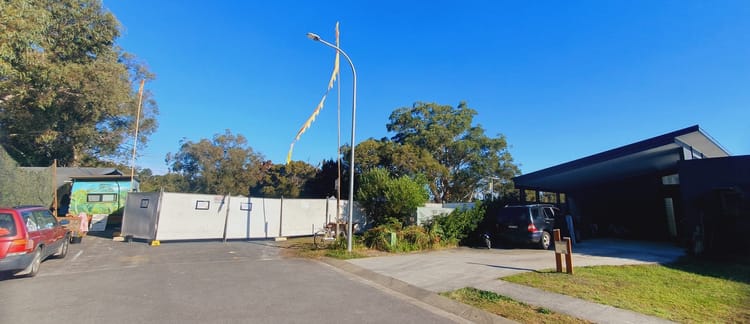

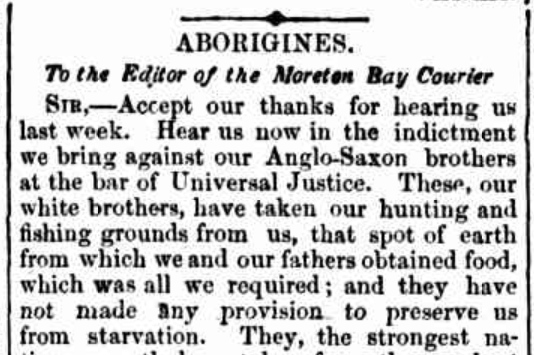
Member discussion